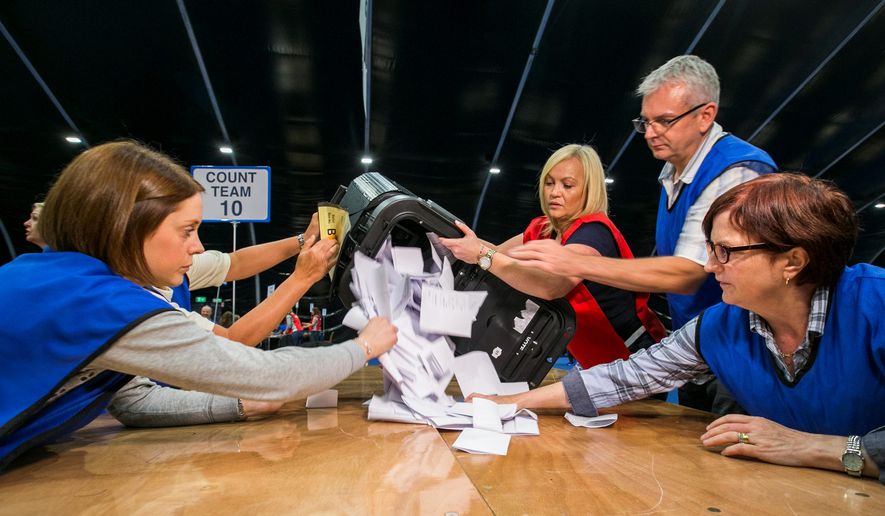The voters of the United Kingdom spoke Thursday and, to the surprise of pundits and their elected officials, declared that they want out of the European Union.
In a historic nail-biter of a referendum, the nation voted to exit the 28-member EU bloc, a result widely seen to have been driven public fear of immigration that has surged in the nation during recent years but which quickly prompted a run on the British currency.
Prime Minister David Cameron, who had campaigned against leaving the EU, announced Friday morning that he will resign in October, saying that “fresh leadership” is now needed in the U.K.
While turnout was at a near record levels, and officials had predicted a tally that was “too close to call,” the major TV networks BBC and ITV called a victory for the “Leave” forces in the so-called “Brexit” vote late Thursday night.
With more than 100 percent of the vote counted, the “Leave” forces had an edge of 51.9 percent to 48.1 percent.
The “remain” forces had carried a slight lead in several areas of the country during early counting on Thursday night. Heading into the referendum, a poll by IPSOS MORI, a leading market research company in the UK and Ireland, had predicted a 4-point victory for Britain to stay in the bloc that it joined in 1973.
Indeed Nigel Farage, head of the anti-EU U.K. Independence Party, had telling reporters Thursday night his side may have come up just short. But later, he was exulting in what he called “Independence Day” for Britain.
“I now dare to dream that the dawn is coming up on an independent United Kingdom,” he said.
The economic effects were swift in early Friday trading in the markets in East Asia. Both Wall Street futures and the British pound had risen strongly Thursday in the belief that the remain forces would win.
The British currency Friday had lost about 12 percent of its value against the U.S. dollar Friday, with the pound worth $1.34, a 30-year low and a 11 percent loss just since Thursday. The Euro was also off against other world currencies, as investors began to doubt the viability of the whole European Union.
The major stock-markets in East Asia all lost significant value, and trading on Japan’s Nikkei Index was reined in automatically under its “circuit breaker” rule, when the market had lost 8 percent of its value.
But on Thursday, the atmosphere was lively across the country. Long lines were reported at many polling stations as many braved torrential downpours and threats of flooding in some areas. Early indications were that turnout topped 70 percent — the highest since the 1997 general election.
Campaign organizers and politicians carried their respective arguments down to the last minute. Prime Minister David Cameron crisscrossed the nation to plead for a vote to stay in the European Union and to “put jobs first, put the economy first.”
“It is a fact that our economy will be weaker if we leave and stronger if we stay,” he told one crowd in Birmingham.
Not all Britons agreed. “We have a strong export capability in Yorkshire from high-tech goods to services,” said Roger Tattersall, assistant director for Vote Leave in the Yorkshire and Humberside region.
“We want to be able to export anywhere in the world without the tariffs that are caused by our membership in the European Union,” Mr. Tattersall said.
Aside from the economic and financial effects of a British exit, U.S. analysts said, a vote to leave would have massive consequences for the European Union and could inspire other eurosceptic groups to follow suit.
“Brexit would inevitably set in motion centrifugal dynamics on the continent, empowering nationalists in countries that have no chance of being successful outside of the EU,” said Dalibor Rohac, a fellow at the American Enterprise Institute.
“From the economic woes of the eurozone, through the political tensions brought about by the refugee crisis, to Russian President Vladimir Putin’s use of propaganda and energy ties to undermine liberal democracy in Central and Eastern Europe, the continent is at a greater risk of descending into chaos than at any point in its postwar history,” Mr. Rohac wrote in a recent commentary.
Brexit proponents said a departure from the European Union would save Britain economically and culturally while freeing the country from the dictates of Brussels on issues such as immigration policy and food standards.
“Our campaign has been about optimism and self-reliance,” said former London Mayor Boris Johnson, who broke with fellow Conservative Mr. Cameron to become a leading voice for the Leave forces.
Despite the differing viewpoints, voters on both sides expressed frustration at how the respective campaigns were handled. “I think it’s been a load of lies on both sides,” said Faith Pearson, 48, an unemployed Brexit supporter from Brompton.
“But I liked Leave because they haven’t told us what the economy is going to be like because they don’t know,” she said. “Remain is telling us, but they can’t make predictions.”
Kieran Clark, a 25-year-old from Yorkshire who voted Remain, wished he had heard more facts. “I’m not too happy with it,” he said, noting a “lot of scaremongering and exaggerated figures.”
“Not a lot of it has been about pure facts and figures,” he said.
Even Britons abroad were irritated with the campaign. “I think it’s made British politics look completely shambolic,” said Fiona Seymour, a 48-year-old Londoner who lives in Berlin. “I think the campaign has been beset with too many in-party rivalries with very little real information being given out, which makes a mockery of the English democratic process.”
• Benjamin Plackett and Patrick Costello contributed to this report from London.
• Guy Taylor can be reached at gtaylor@washingtontimes.com.




Please read our comment policy before commenting.